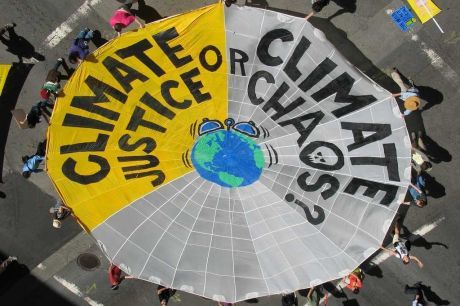Features
You are here
UN climate change report: climate change bad and getting worse

December 21, 2014
The United Nations Intergovernmental Panel on Climate Change (IPCC) has published its fifth report on climate change and the results are frightening, if not surprising.
They conclude climate change is already happening, it is human caused, and at this point, even if all greenhouse gas emissions were to stop today, it is too late to completely stop a number of harmful climate change effects from taking place. Furthermore, greenhouse gas emissions need to reach zero before the year 2100 if we are to avoid irreversible impacts.
“In recent decades, changes in climate have caused impacts on natural and human systems on all continents and across the oceans.” These effects include increased heat waves, and heat related human mortality, extreme precipitation and flooding, extreme sea levels, as well as droughts, floods, cyclones, and wildfires.
The report outlines a number of scenarios based on the degree to which carbon emissions are limited. “A stringent mitigation scenario (RCP2.6), two intermediate scenarios (RCP4.5 and RCP6.0), and one scenario with very high greenhouse gas emissions (RCP8.5)”
Surface temperature is projected to rise over the 21st century under every one of the assessed emission scenarios. Though the best case scenario would result in a raised temperature of under 2°C the majority of scenarios would result in a temperature rise of more then 2°C with the worst case scenario (the one we are currently on track for) reaching up to 4°C.
The best case scenario, the one with a higher chance of avoiding irreparable effects will require a massive reduction in greenhouse gas emissions, “These scenarios are characterized by 40 per cent to 70 per cent global anthropogenic GHG emissions reductions by 2050 compared to 2010, and emissions levels near zero or below in 2100.”
On the other hand, without any additional efforts to reduce GHG emissions beyond those in place today, “global emissions growth is expected to persist, driven by growth in global population and economic activities. Global mean surface temperature increases in 2100 in baseline scenarios – those without additional mitigation – range from 3.7 to 4.8°C above the average.”
The report concludes that climate change will result in:
* “A large fraction of species faces increased extinction risk due to climate change during and beyond the 21st century.”
* “Marine organisms will face progressively lower oxygen levels and high rates and magnitudes of ocean acidification.”
* “Climate change is projected to undermine food security.”
* “Global temperature increases of ~4°C or more above late-20th century levels, combined with increasing food demand, would pose large risks to food security globally.”
* “Until mid-century, projected climate change will impact human health by exacerbating health problems that already exist.”
Due to the localised nature of some of the effects, climate change is expected to both increase poverty in some regions, and amplify the likelihood of armed conflict as a result of resource scarcity. Furthermore “Populations that lack the resources for planned migration experience higher exposure to extreme weather events, particularly in developing countries with low income.”
According to this UN report, at least some of these effects are now unavoidable, thus the report calls for a global effort to both mitigate further green house gas emissions as well as adaptation to a world experiencing climate change.
The report also stresses the importance of international cooperative action over the actions of individual actors, and argues for transformational change over incremental change. “Restricting adaptation responses to incremental changes to existing systems and structures, without considering transformational change, may increase costs and losses, and miss opportunities.”
Decades of inaction on regulating and eliminating green house gasses have shown that capitalism is incapable of saving us from the climate chaos it has produced. The only solution is an international anti-capitalist mass movement that can put control over our economy in the hands of the people.
Section:
Topics:










